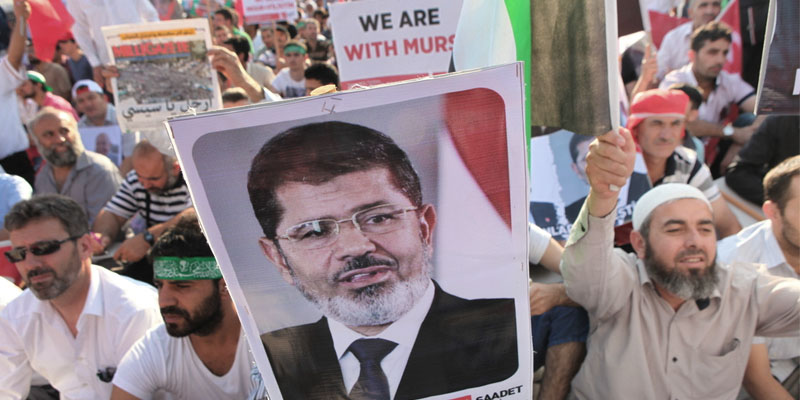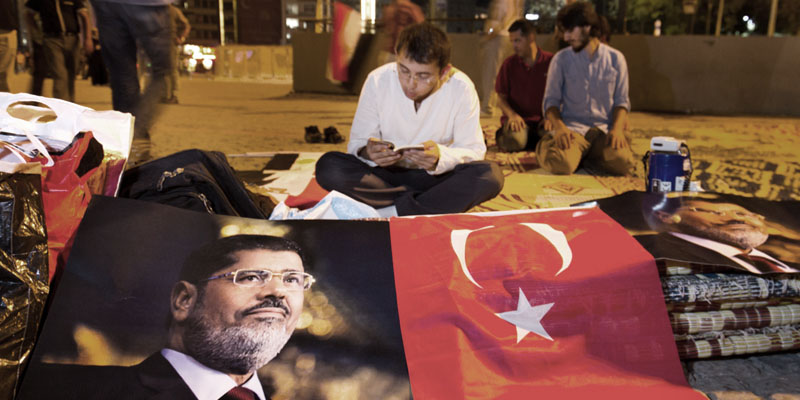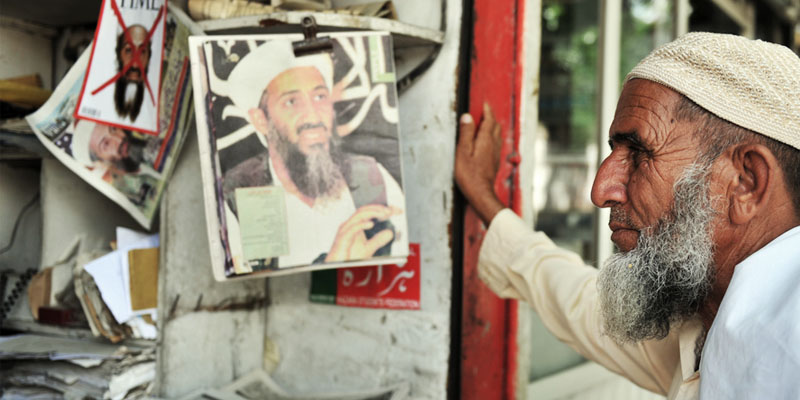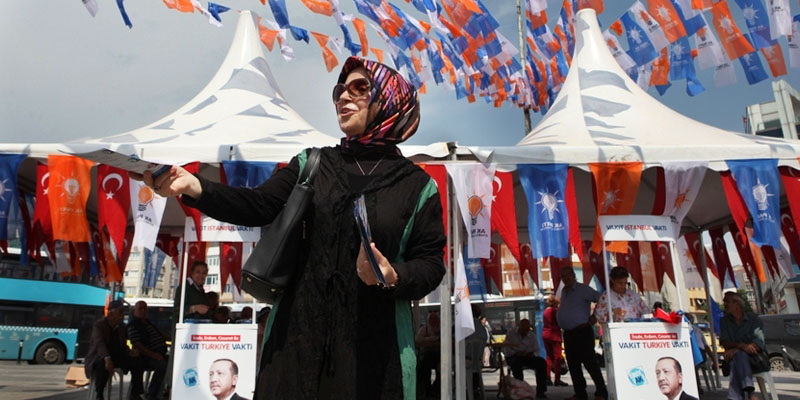We explore Islamism, and explain the foundations on which this political ideology is based. In addition, we discuss its characteristics and the difference with Islam.

What is Islamism?
Islamism is an ideology which holds that political action within society should be founded on the doctrine of Islam. Its main objective is the creation of an Islamic state rooted in the sharia (Muslim law) to transform all aspects of society, such as economy, law, social justice, and foreign policy.
Islamism is a highly heterogeneous movement encompassing dozens of Islamist political groups with contrasting agendas, values, and affiliations to the different branches of Islam. It comprises democratic, conservative, and moderate groups as well as radicalized associations and terrorist organizations.
Despite their differences, all Islamist movements seek to transform society through Islamic education and political and social action. Most of them hold that power should be attained by democratic means. They advocate a return to "authentic Islam", as opposed to the Westernization of society that is taking place as a result of globalization.
Leading Islamist groups include the Muslim Brotherhood in Egypt, Syria, Jordan, Libya and Yemen, among other countries, the Justice and Development Party in Turkey (AKD, from its Turkish acronym), and the Justice and Development Party in Morocco (PJD, from its Arabic acronym).
Due to the terrorist attacks perpetrated during the 2000s by groups such as Al-Qaeda (led by Osama bin Laden), Islamism has become a highly controversial and often misjudged movement. It is common for Western media to bring together terrorist movements under the concept of "Islamism".
However, these and other terrorist groups should be understood as a specific phenomenon that is not representative of the broader Islamist movement. The majority of the political groups within Islamism currently operate within their countries’ legal political system, and do not resort to violence to achieve their goals.
Islam and Islamism. Islam is the monotheistic religion practiced by Muslims. The main Islamic prophet is Muhammad, its God is Allah, and its holy book is the Qur'an.
Islamism, in contrast, is an ideology which holds that political and social organization must be rooted in the sharia, the religious law. As a political movement, it is highly heterogeneous, encompassing from moderate associations to radical terrorist groups.
- See also: Imperialism
Origins of Islamism
The earliest antecedent of Islamism is the Muslim reformist movement that emerged in Iran in the late 19th century. Faced with the decline of the Ottoman Empire and the threat of European colonization, a group of thinkers saw the need to modernize the existing political order.
The most prominent exponents of this movement were Jamal-al-Din al-Afghani, Muhammad Abduh, and Rashid Rida. They advocated national unity and the struggle against despotic governments that made alliances with the West to remain in power.
Thinkers of the "Islamic awakening"
Beginning in the 1930s, various thinkers gave impetus to what came to be known as the "Islamic awakening". Among the most prominent figures within Sunni Islam were Abul A’la Maududi (1903-1979), Hassan al-Banna (1906-1949), and Sayyid Qutb (1906-1966); the most notable exponent within Shia Islam was Ruhollah Khomeini (1902-1989).
This group of intellectuals formulated political theories that tied earthly political organization to religious beliefs on divine and human nature. They recognized the negative aspects of their society, and believed its decadence was brought about by having deviated from God's intended plan.
These thinkers blamed the Western powers and modernizing currents for the malaise in their societies. They therefore considered it essential that states become organized according to the precepts of Muslim morality and lifestyle in order to regain their social well-being and prosperity.
Abul A'la Maududi (1903-1979)
Maududi held that sovereignty resides in Allah and that no one can claim to represent God on Earth, but rather that divine authority lies with the community as a whole. Thus, he postulated what came to be termed as a theodemocracy: each member of the Muslim community enjoys the rights and powers of the caliphate (government) of God.
However, this vision promotes an ideological and authoritarian State, grounded in the divine duty to exercise moral and religious control over all creation.
Hassan al-Banna (1906-1949)
Hassan al-Banna developed his thought around the decadence, corruption, and humiliation he observed in Muslim societies.
He held that the creation of an Islamic state was imperative, which would reform every aspect of life, present resistance to Western ideologues, and be capable of creating a new Islamic order. Hassan al-Banna was one of the founders of the Islamist organization called the "Muslim Brotherhood".
Sayyid Qutb (1906-1966)
Sayyid Qutb was one of the most influential ideologues of radical Islam and extremist Islamic movements. Like the other thinkers, he considered Muslim society to be in a sorry state and far removed from God's plan.
Qutb advocated a complete break from the established order, and believed that Islam, as the ultimate revealed divine guidance, had the right to impose its system on the whole world so that all humanity could benefit.
He regarded all non-Islamic systems as oppressive because they led men away from God’s path. Therefore, he believed it was necessary to wage war against local governments. In this regard, he redefined the Islamic concept of jihad (holy war).
Ruhollah Khomeini (1902-1989)
Ruhollah Khomeini broke with the politically quietist tradition within the Shiites, led the overthrow of Shah Mohammad Reza Pahlavi, and was the founder of the Islamic Republic of Iran.
He asserted the necessity of subordinating political power to Islamic objectives and precepts. He also believed that the system of government should be designed by religious scholars, who should assume the primary legislative and administrative tasks to introduce a profound reform action plan and guide society according to the divine plan.
Ruhollah Khomeini condemned any system or idea not stemming from Islamic precepts.
Muslim Brotherhood

The Muslim Brotherhood is among the leading Islamist organizations. Throughout its history, depending on the political and social context, it has gone through various periods of radicalization and moderation of its actions.
It has gone from being an organization focused on social service and anti-colonialist activism to paramilitary action and armed struggle against the government, only to re-emerge as a legitimate institution committed to political work within democratic channels.
Origins of the Muslim Brotherhood
Following World War I (1914-1918), the dissolution of the Ottoman Empire allowed European colonialism to penetrate into the territories of West Asia and North Africa. The main form of government of Islam was the caliphate (the ruling regime of the Ottoman Empire), which was abolished in 1924 and replaced by a Western-style republican government.
One of the leading organizations to emerge in this context was the Muslim Brotherhood, founded by Hassan al-Banna in Egypt in 1928. Originally, its aim was to oppose British colonialism and the secularization of society.
During the 1930s, the Muslim Brotherhood set up a network of social welfare organizations, schools, hospitals, and unions. Simultaneously, they developed a militant wing of semi-secret paramilitary organizations.
During the 1940s, tensions as well as their opposition to the government grew, and in 1949 they carried out their first attack: the assassination of Egyptian Prime Minister Mahmoud al-Nukrashi Pasha. In retaliation, the government launched a wave of repression, which included the assassination of Brotherhood leader Hassan al-Banna.
Over the next decade, the Muslim Brotherhood continued its underground operations, becoming a mass movement and the main opposition to the government outside Parliament. Branches of the Brotherhood were created in other countries in the region, including Lebanon, Syria, Jordan, Palestine, and Sudan.
Radicalization of the organization
In Egypt, the Muslim Brotherhood continued to face repression and radicalized its position by aligning itself with the ideas of Sayyid Qutb. In 1954, Egypt witnessed the assassination attempt on President Nasser, and the government blamed the Brothers (members of the Muslim Brotherhood) and intensified its measures of repression.
In 1966, Sayyid Qutb was accused of having participated in another attempt on the president's life, and was executed for conspiring against his government.
Underground operations and growth
Throughout the 1970s and 1980s, the Brotherhood continued with its underground activities. When the Egyptian government adopted a neoliberal state policy as a result of negotiations with the International Monetary Fund (IMF), the Muslim Brotherhood multiplied its social services network to address rising unemployment and poverty.
At the same time, its ranks were reinvigorated by university student activism, and its revolutionary approach moved away from violent means. Over time, it became a more heterogeneous grassroots organization, drawing support from increasingly broader segments of the population.
Egyptian Revolution
In 2011, a series of spontaneous protests broke out across Egypt against the government of Hosni Mubarak, who had been in power for thirty years, since 1981. Demonstrations spread to become the Egyptian Revolution, which overthrew the president and called an election.
The Muslim Brotherhood ran in these elections through the creation of the Freedom and Justice Party, with Mohammed Morsi as the principal candidate, and won with 70% of the votes.
However, Morsi's government was short-lived. Upon taking office, he introduced a series of anti-democratic measures and centralized power in the hands of the presidency. He aimed to establish a government grounded in the principles of Muslim law. He dissolved Parliament and replaced it with a legislative assembly dominated by his supporters, and brought the judiciary under his control. In 2012, he issued a decree granting himself immunity.
These actions met widespread repudiation and opposition from various segments of the population. The following year, a military coup led by Abdel Fattah al-Sisi overthrew the Muslim Brotherhood’s government. The new authorities suppressed the Brotherhood, ordered its dissolution as well as that of its satellite organizations, and confiscated all their assets.
Jihadism

Jihadism is the name given to radical Islamist movements that employ violence as a means to achieve their political objectives. The term jihad is a concept within Islam that legitimizes warfare to defend the Islamic community. However, the different Islamic groups interpret this in contrasting ways.
Within the logic of movements that resort to violence, it is argued that the West (its political regimes, ideas, and ways of life) poses a threat to Muslim society, justifying jihad as both a war of self-defense and a duty for every Muslim.
Jihadists believe that in order to achieve the universal implementation of Islamic law, they must defeat Western enemies, and this can only be achieved through armed violence.
Most jihadist organizations are regarded as terrorist groups by the Western powers. Among them are:
- Al-Qaeda. A jihadist organization that brought together various radical movements. Under the leadership of Osama bin Laden, during the 1990s, it consolidated as one of the world's leading terrorist organizations. Its members are responsible for the September 11, 2001 attacks on the Twin Towers and the Pentagon, as well as the US embassies in Kenya and Tanzania, among other countries.
- Taliban. The Taliban is a political, religious, and military Islamist movement in Afghanistan. In 1994, they launched a military revolt and civil war against the Afghan government, finally imposing themselves in 1996. With an orthodox and fundamentalist interpretation of Islamic law, they established an authoritarian government that severely curtailed civil liberties. In 2001, the United States invaded Afghanistan and defeated the Taliban. Their leaders took refuge in Pakistan, strengthened their ties with Al-Qaeda, and continued the armed struggle in various regions of the country.
- Islamic State. Also known as "Daesh", it is a radical Islamist group led by Abu Bakr al-Baghdadi that splintered from Al-Qaeda. It aims to conquer or politically control countries with a Muslim-majority population. In 2014, they managed to capture territories in Syria and Iraq, proclaiming the creation of a new caliphate. The Syrian government and Western military forces (the United States, England, and other European powers) went to war to halt their advance. Since then, Daesh has released videos showing the execution of American and British journalists and other political prisoners. Under their rule, fundamentalist Muslim law was instituted.
21st-century moderate Islamism

Unlike radical Islamist movements, other branches of Islamism have developed more moderate discourses in harmony with democratic ideas and republican systems. During the 2000s, several Islamist groups gradually began to replace revolutionary discourses of resistance to non-Islamist regimes with discourses of pragmatism and reform.
Most of them directed their political action towards political party activities, engaging in democratic elections and the parliamentary system.
Furthermore, Islamist militants recognized the difficulty of trying to impose fundamentalist regimes based solely on Muslim law. Instead, a good number of them promote a strategy of "Islamizing" existing laws and society through parliamentary activity and community-based welfare organizations.
Among the most important moderate Islamist groups are the Justice and Development Party (known as AKP) in Turkey, the Muslim Brotherhood in Egypt, the Justice and Development Party (known as PJD) in Morocco, and the Ennahda party in Tunisia.
Osama bin Laden (1957-2011)
Osama bin Laden was a Saudi Arabian-born politician, radical Islamic terrorism militant, and founder of the paramilitary terrorist organization known as Al-Qaeda. He is held responsible for multiple terrorist attacks against American and Western interests, most notably the attacks on the Twin Towers in New York and the Pentagon in Washington in 2001.
Bin Laden was raised in Medina and Hejaz, the son of one of Saudi Arabia's wealthiest families. He began his military activity in 1979, when he joined the Afghan Islamist guerrilla to fight against the Soviet occupation of Afghanistan. There, he founded the radical fundamentalist and anti-communist Al-Qaeda organization. The Afghan guerrillas drew military and economic support from the US, Saudi Arabia, and Pakistan.
Following the withdrawal of Soviet troops from Afghanistan in 1989, Bin Laden returned to Saudi Arabia as a war hero. He did not demobilize Al-Qaeda but used it as a base to promote radical Pan-Islamism. He believed in the necessity of uniting Islamic nations under an Islamist government system and fighting foreign enemies. In this context, he began to act against the Saudi monarchy due to the presence of American troops. The Saudi government revoked his citizenship and expelled him from the country.
From then onward, he turned to clandestine terrorist activity. He centered his discourse around the promotion of jihad against the United States, which he condemned as the main symbol of Judeo-Christian values. He is believed to have amassed hundreds of millions of dollars for this cause. His violent fundamentalism attracted the most radicalized sectors of Islamism.
From the 1990s onward, the United States identified him as a potential enemy of Western civilization. He became the prime suspect of the September 11, 2001 attacks on the Twin Towers in New York and the Pentagon in Washington. The United States declared a "war on terror" and invaded Afghanistan, where the terrorist was allegedly hiding.
For the next decade, Bin Laden was hunted and was eventually found and killed by a US military operation in May 2011.
Explore next:
References
- Bello, M. I. F. (1997). Islamismo. Scripta Fulgentina: revista de teología y humanidades, 7(13), 81-93.
- Britannica, The Editors of Encyclopaedia (2023). "Osama bin Laden". Encyclopedia Britannica https://www.britannica.com/
- Fuente Cobo, I. (2015). El yihadismo en su contexto histórico. En Cuadernos de estrategia, N°173, pp. 37-70.
- Gutiérrez de Terán, I. (2004). Islamismo, Política y Terrorismo. Desde la
- constitución de la Umma hasta la emergencia del Islam radical. En: Cuaderno del Instituto Vasco de Criminología, N° 18, pp. 159-172.
- Izquierdo Brichs, F. (2011). Islam político en el siglo XXI. En Revista CIDOB d’Afers Internacionals, núm. 93-94, p. 11-32.
- Moya Mena, S. I. (2016). El islam y sus manifestaciones sociopolíticas contemporáneas. Editorial UCR.
- Tamayo-Acosta, J. J. (2009). El despertar político y religioso del islam. Islam: cultura, religión y política. Ed. Trotta
Was this information useful to you?
Yes NoThank you for visiting us :)